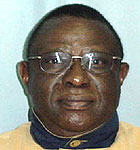Théoneste Bagosora
| Théoneste Bagosora | |
|---|---|
 |
|
| Born |
16 August 1941 Giciye, Nyabihu District, Western Province, Rwanda |
| Occupation | Military officer |
| Criminal charge |
Genocide Crimes against humanity War crimes |
| Criminal penalty | Life imprisonment |
| Criminal status | Incarcerated |
Colonel Théoneste Bagosora (born 16 August 1941) is a former Rwandan military officer. He is chiefly known for his key role in the 1994 Rwandan Genocide, for which he has been sentenced to life imprisonment by the International Criminal Tribunal for Rwanda (ICTR). The sentence was reduced to 35 years imprisonment on appeal.
Bagosora was born in Giciye in what is now Nyabihu District, Western Province, Rwanda. In 1964 he graduated from the École des officiers (Officers' School) in Kigali with the rank of second lieutenant, and continued his studies in France. During his military career he served as second-in-command of the École supérieure militaire (Superior Military School) in Kigali and as commander of Kanombe military camp.
He was appointed to the position of directeur du cabinet (chief of staff) in the Ministry of Defence in June 1992. Despite officially retiring from the military on 23 September 1993, he retained this post until fleeing the country in July 1994.
Bagosora was born in the same northern region as Juvénal Habyarimana, the president of Rwanda from 1973 to 1994. He was linked to le Clan de Madame, known later as the akazu, a group associated with Agathe Habyarimana, the president's wife, who was at the nexus of the Hutu Power ideology.
Although he was present at the negotiations of the Arusha Accords in August 1993, he never supported them and is widely cited as saying, once everything was signed, that he was returning to Rwanda to "prepare for the apocalypse". Luc Marchal, a Belgian officer, who served as Kigali sector commander in UNAMIR, reported that Bagosora told him that the only way to solve Rwanda's problems was to get rid of the Tutsi.
Bagosora was responsible for establishing paramilitary "self-defense" units, the Interahamwe, that would operate in every commune in the country. These groups were to act in concert with the local police, militias, and military authorities. Bagosora was also responsible for distributing arms and machetes throughout Rwanda. Between January 1993 and March 1994 Rwanda imported more than 500,000 machetes, twice the number than imported in previous years. There were lists drawn up identifying people as enemies. The stage was set.
...
Wikipedia
